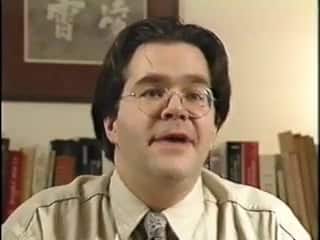Playlist: The Book of Songs: The Han Dynasty Codification
Imputed Role of Confucius in Compilation of Book of Songs
Confucius (551-479 BCE) lived during the Spring and Autumn Period and traveled among the feudal states of the Eastern Zhou dynasty (771-256 BCE), seeking to advise the feudal lords on how to establish and maintain social order.
Transcript
Robert Oxnam: The importance of agriculture, ritual, and the Mandate of Heaven is reflected in the teachings of the philosopher Confucius, who lived in the sixth century before the Common Era, the century in which the Book of Songs, or Classic of Poetry, began to evolve into its final form.*
And indeed, legend has it that Confucius played a major role in the compilation of the Book of Songs.
Stephen Owen: It was believed that Confucius defined, not only selected, all the poems in the Classic of Poetry, but also that he defined the order of the poems in the anthology, to show the rise and fall of the Zhou dynasty.
* The Book of Songs is also known as the Book of Poetry, the Classic of Poetry, and sometimes the Book of Odes. These are all possible translations of the Chinese title, Shi jing [Shih-ching in Wade-Giles romanization].
Zhou Society and Poetry as Models
Transcript
Robert Oxnam: Confucius saw the Zhou dynasty as the model dynasty, a period when the rites were observed and society was at peace; and poetry, for Confucius, was central to human expression.
David D. W. Wang: As Confucius said, "Poetry is such a wonderful genre, which can teach us how to stir up the listener's feeling. It can teach us how to observe or reflect the objective world. It can teach us how to make companions in the social communities. And it can teach us how to channel out our deepest feelings, be it sorrow or happiness."
* The Book of Songs is also known as the Book of Poetry, the Classic of Poetry, and sometimes the Book of Odes. These are all possible translations of the Chinese title, Shi jing [Shih-ching in Wade-Giles romanization].
Confucians Take Possession of the Book of Songs
Transcript
Robert Oxnam: Confucius and his followers included the Book of Songs as one of the original classics of the Confucian canon from earliest times.
Later generations of Confucian scholars made every effort to incorporate the Book of Songs into their worldview.
Stephen Owen: As China changed from this early period, 600 BC to 400 BC, the Spring and Autumn Annals period, as it changed to the Warring States period, which is the period that follows, you begin to find the Classic of Poetry becoming the possession of the Confucians; that is, the old courts are breaking up, the old sort of feudal dynasties are falling apart.*
* The Book of Songs is also known as the Book of Poetry, the Classic of Poetry, and sometimes the Book of Odes. These are all possible translations of the Chinese title, Shi jing [Shih-ching in Wade-Giles romanization].
Codification and Interpretation by Han Dynasty Scholars
The Han dynasty (202 BCE-220 CE) replaced the short-lived Qin dynasty (221-207 BCE) that had unified China. The Han empire drew upon this centralized political foundation.
Transcript
Paul Rouzer: Eventually when Confucianism became increasingly important in Chinese culture and among the Chinese educated classes, particularly in the Han dynasty from about the second century BC through the second century AD, it became very important for Confucian philosophers of this period to take all of these early texts and find major moral Confucian reasons for why these texts should be so important.
*The Book of Songs is also known as the Book of Poetry, the Classic of Poetry, and sometimes the Book of Odes. These are all possible translations of the Chinese title, Shi jing [Shih-ching in Wade-Giles romanization].
About the Speakers
Robert B. Oxnam
President Emeritus, Asia Society
Stephen Owen
James Bryant Conant University Professor; Professor of Comparative Literature, Harvard University
Paul Rouzer
Associate Professor, Department of Asian Languages and Literatures, University of Minnesota
Marsha Wagner
Adjunct Professor of Chinese Literature, Columbia University
David D. W. Wang
Edward C. Henderson Professor of Chinese Literature, Harvard University
Related Videos
The Book of Songs and China’s Literary Tradition
The Book of Songs: Legends of the Zhou and the Nature of Chinese Society
The Book of Songs: “The Great Preface” and Five Notions about Poetry
Individual Voices in the Book of Songs








